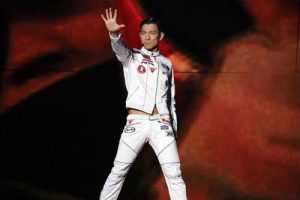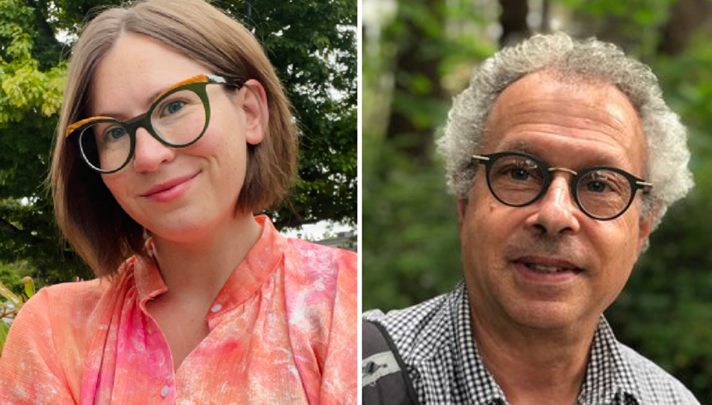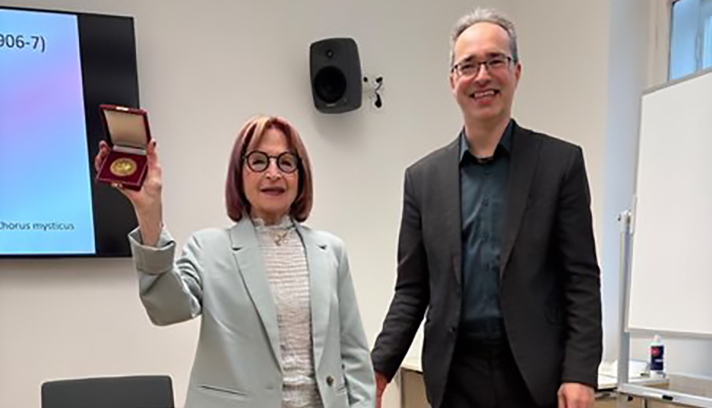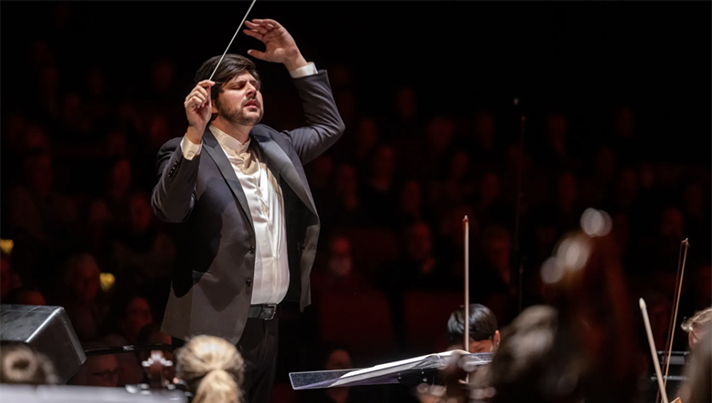Musicologist and 18th-century French opera expert Dr. Hedy Law goes back to her Hong Kong roots with an exciting new course — the first of its kind in North America
By Tze Liew


Assistant Professor Dr. Hedy Law
Dr. Hedy Law has always been aware of a certain irony at the heart of her academic career. An expert on 18th century French opera and pantomime, she grew up immersed in a very different tradition: her mother was a Cantonese opera teacher.
The contrast wasn’t something she thought too much about, until recently. After more than a decade teaching Western music and theory, she found her attention wandering from the powdered wigs and tinkling harpsichords of Mozart to the phoenix eyes and plaintive erhu that she grew up with in Hong Kong.
Dr. Law realized that she was missing something: a connection to her own cultural roots. It was this feeling that inspired her to design and launch UBC’s brand-new Cantonese Music course, the first of its kind in North America, and a unique addition to the UBC Cantonese Language program.
“I had the huge realization that I’ve been teaching Western music for so long. I thought, if I only teach Monteverdi through Mozart, then I’ll never have a chance to teach Cantonese repertory within the curriculum here. And so I’m just like, really? That seems to be a really big opportunity lost,” she says.
Dr. Law’s course is a broad overview of major Cantonese music genres since the early 19th century, from Cantonese opera to Cantopop (Cantonese pop music) and everything in between.
In Cantonese music, language defines the melody: there is an expectation for musical contour to be shaped around the six linguistic tones of the language. So the music ends up carrying the essence of the language, like a pickle jar in which cultural nuance is preserved.
It follows the footprints of a long and rich history, no smaller in scope than the Western music canon. Cantonese opera, for example, appeared in Guangzhou in the 13th century — about 400 years before opera was invented in Italy in the 1600s. Its flourishing in the 20th century sparked Golden Ages in Cantonese television and film from the 1970s to 1990s, lighting the fuse for the Cantopop explosion in the 1980s that left an indelible mark on Asian communities worldwide.
“Cantonese music is a global phenomenon. We have a huge Chinese diaspora that shares popular genres like Cantopop, musicals and TV dramas,” says Dr. Law.
Since the course debuted in January this year, the response from the community has been overwhelmingly positive.


Singer and actor Andy Lau, one of the “Four Heavenly Kings of Cantopop” from the 1990s and early 2000s. Photo: Wikimedia Commons
“It poses the challenge to us to explore what a Chinese cultural identity is these days,” says student Demitri Lau. Demitri is a second-generation Hong Kong Canadian, born and raised in Vancouver. There are many other students like him, Chinese-Canadians born to immigrant parents from Hong Kong, Taiwan, mainland China, Indonesia, Malaysia, Singapore, the Philippines and more — all connected to, or curious about, Cantonese culture in some personal way.
Dr. Law is keen to nurture that curiosity. She feels fortunate to have grown up surrounded by the colourful sights and sounds of Cantonese opera: lavish costumes with flowing sleeves, and intricate hairpieces laden with jewellery. Sharp, bright voices embellished by the lively clack-clack of wooden clappers, and the sweeping strings of the Chinese orchestra.
But she dismissed them in her youth, as did many of her generation. Cantonese opera was a dying art at the time. “I used to think it was noisy. I didn’t think it mattered to me as someone who wanted to become a serious musicologist,” she remembers.
Growing up in Hong Kong in the 1980s, Dr. Law was educated in the colonial school system. It was natural to want to learn to play the piano, take British conservatory exams, and master the Western classical canon. She left Hong Kong when she was 23 to pursue musicology in England and then the United States, eventually arriving in Vancouver.
Despite a successful academic career, she began to feel lost from all her time abroad — like a puzzle piece that didn’t quite fit anywhere culturally. “For eleven years I identified with Americans, and now I identify with Canadians. I have a British passport, I speak fluent Cantonese. My specialty is in 18th century French music. It’s just all mixed up!” Dr. Law exclaims with a laugh.
So she began to look back towards Hong Kong, whose global cultural profile has been rising since the handover from Britain in 1997. In the field of musicology, there has been a surge in Cantonese studies published in English over the last two decades, spearheaded by Hong Kong-American scholar Bell Yung and other Chinese and Western scholars.
“I thought: I know the music; there’s enough teaching material available, so the time is ripe.”
WATCH: Fiona Sit sings “Sugar” (糖不甩)
Vancouver is a thriving hub of Cantonese culture, home to many iconic artists — from famous Cantonese opera singers like the late Yam Kim-Fai (任劍輝) and Bat Sheut-Sin (白雪仙), to Cantopop business professionals like Chris Ho (何兆基), who recently produced the chart topper “A Person Nearby” (附近的人) with his band Yellow! (野佬) right here in the city. And the history goes way back. At the Museum of Anthropology, Dr. Law’s students had the opportunity to explore a treasure trove of Cantonese opera costumes, props, and stage dressings from the early 20th century. These artefacts, and the music they’re studying, reveal stories about the Cantonese immigrant experience that isn’t properly recorded in history books.
“When we look at Cantonese documents translated by the British in the 19th century, there’s a tendency for colloquial meaning to be removed, to make it more formal or more ‘sophisticated.’ On a scholarly level these are just incorrect, inaccurate translations,” says Dr. Law. “But when we do transcription and translation exercises on Cantonese songs, or even just listen — we discover that an extra layer of meaning is actually kept alive in the music.”
In Cantonese music, language defines the melody: there is an expectation for musical contour to be shaped around the six linguistic tones of the language. So the music ends up carrying the essence of the language, like a pickle jar in which cultural nuance is preserved. This is a unique perspective that isn’t typically found in most musical cultures, and that contributes something new to the music theory field.
“Once we recognize that language tones can play such an important role, it changes the way we analyze music. Instead of always using the Western lens of form and harmony, the theory of Cantonese linguistic tones gives us new analytical parameters to think about,” Dr. Law explains.
Her Cantonese Music course is an important addition to the musicology program at the School of Music. “The program has a long and rich tradition of East Asian studies, beginning with Dr. Elliott Weisgarber, who arrived on campus in 1960 with a strong interest in Japanese music, through to Dr. Alan Thrasher’s work on music from mainland China,” says Director T. Patrick Carrabré. “I’m excited that our students will have an opportunity to dive into yet another great musical tradition.”
Today, Dr. Law is happy to see that Cantonese opera is making a comeback. “Hong Kong has been trying to incorporate it into the youth curriculum. Kids love it: cool story, singing, dancing, martial arts, plus they get to wear makeup and shiny clothes! It’s just so interesting to see that biases remain in my generation, but kids don’t have that kind of bias.” She is proud to be part of a movement reviving her hometown’s traditions.
WATCH: 白驅榮 (1892-1974), one of the Four Great Kings of Cantonese Opera, sings “Sorrows on an Autumn Trip” (客途秋恨) and other classics.
It’s the spark of human connection that most inspires Dr. Law. She is especially moved by the sense of reciprocal curiosity she sees in her students. She wants the class to be a place where students of all backgrounds — including different groups of Chinese, East Asians, Eurasians, and Canadian-Asians — can relate to each other, bond over a multifaceted understanding of Cantonese music, and feel like part of a community.
“The music you grew up listening to stays with you wherever you go. It’s very similar to food. We have a taste for it, and it will never leave you,” says Dr. Law.
“I’m really looking forward to relating some of what I’ve learned in this course to my grandparents,” says student Demitri Lau. “I think they’ll be very surprised to know there are courses being taught in English about the music they listen to.”
“I see it as a kind of intergenerational — and transnational bonding,” says Dr. Law. “My mum loved the idea of me teaching this class. It makes me feel closer to her. And through my students I’m becoming closer with the younger generation.”
After the pilot class this term, Dr. Law will teach the course every two years. She plans to write a monograph on Cantonese music and looks forward to collaborating with specialists in the Department of Asian Studies and practitioners in the music business.
Dr. Law is co-organizing a Cantonese Lyrics Competition: “Combating Covid-19” with Asian Studies and the Cantonese Language program, as an outlet for UBC students to express their experiences of #Covid19 through songwriting. Adjudicators consist of top industry professionals in Hong Kong. The winner’s song will be produced and released on iTunes and Spotify in June this year. Deadline to submit is April 30!
Cantonese Music is a cross-listed course in Asian Studies and Music, and part of a bigger umbrella of courses on Hong Kong offered at UBC. These courses, coordinated by Professor Leo Shin of the UBC Hong Kong Studies Initiatives, complement the UBC Cantonese Language program. Directed by Raymond Pai and supported by Dr. Zoe Lam, the UBC Cantonese program has over the last few years rapidly become the leading Cantonese language instruction program outside Hong Kong.


